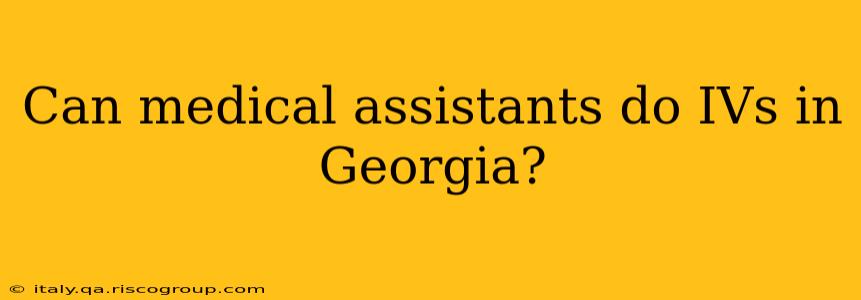The question of whether medical assistants (MAs) can administer IVs in Georgia is complex and depends on several factors. There's no simple yes or no answer. This detailed guide will explore the legal landscape, scope of practice, and training requirements surrounding IV therapy performed by MAs in the Peach State.
Georgia's Regulatory Landscape for IV Therapy
Georgia's regulations regarding who can administer intravenous therapy are primarily governed by the Georgia Composite Medical Board (GCMB). This board sets the standards for medical practice and defines the scope of practice for various healthcare professionals, including medical assistants. Crucially, the GCMB's regulations emphasize that only licensed medical professionals can perform medical procedures, including IV insertion and administration.
The Role of Medical Assistants in Georgia
Medical assistants in Georgia are generally permitted to perform a range of clinical and administrative tasks under the direct supervision of a licensed physician or other qualified healthcare provider. However, administering IVs is typically considered outside the scope of practice for a standard medical assistant in Georgia.
Scope of Practice Variations
It's important to note that the exact scope of practice for a medical assistant can vary depending on:
- Their specific training and certification: Some MAs might have additional certifications or training that expands their permissible tasks, but this rarely includes IV therapy.
- The employing physician or healthcare facility's policies: A clinic's internal policies may dictate certain tasks MAs can perform under close supervision, but these policies cannot override state regulations.
- The specific type of IV therapy: Simple fluid replacement might be handled differently than administering medications intravenously. The latter almost certainly falls outside the scope of a standard MA's duties.
Understanding the Legal Ramifications
Allowing a medical assistant to perform IVs without proper licensing and supervision could lead to serious legal consequences for both the MA and the supervising physician or healthcare facility. This could include:
- Malpractice lawsuits: In case of complications or adverse events resulting from improper IV administration.
- Disciplinary action by the GCMB: This could include fines, suspension, or revocation of licenses.
- Criminal charges: In extreme cases, particularly if negligence or willful misconduct is involved.
What about Advanced Training?
While basic medical assistant training doesn't qualify individuals to administer IVs, some programs offer advanced training in phlebotomy or other specialized procedures. Even with advanced training, however, the legal ability to administer IVs in Georgia is likely restricted to licensed professionals like Registered Nurses (RNs), Licensed Practical Nurses (LPNs), and physicians. Any such training received should not be misconstrued as authorization to perform IV therapy independently or outside the direct supervision of a licensed practitioner.
Conclusion: Medical Assistants and IVs in Georgia - A Cautious Approach
In summary, while medical assistants in Georgia perform valuable roles in healthcare settings, administering IVs generally falls outside their permitted scope of practice. The risks associated with improper IV administration are significant, highlighting the importance of adhering to Georgia's regulations and ensuring that only appropriately licensed and trained professionals undertake this procedure. Always consult with the GCMB or legal counsel for definitive clarification on specific scenarios and situations.

